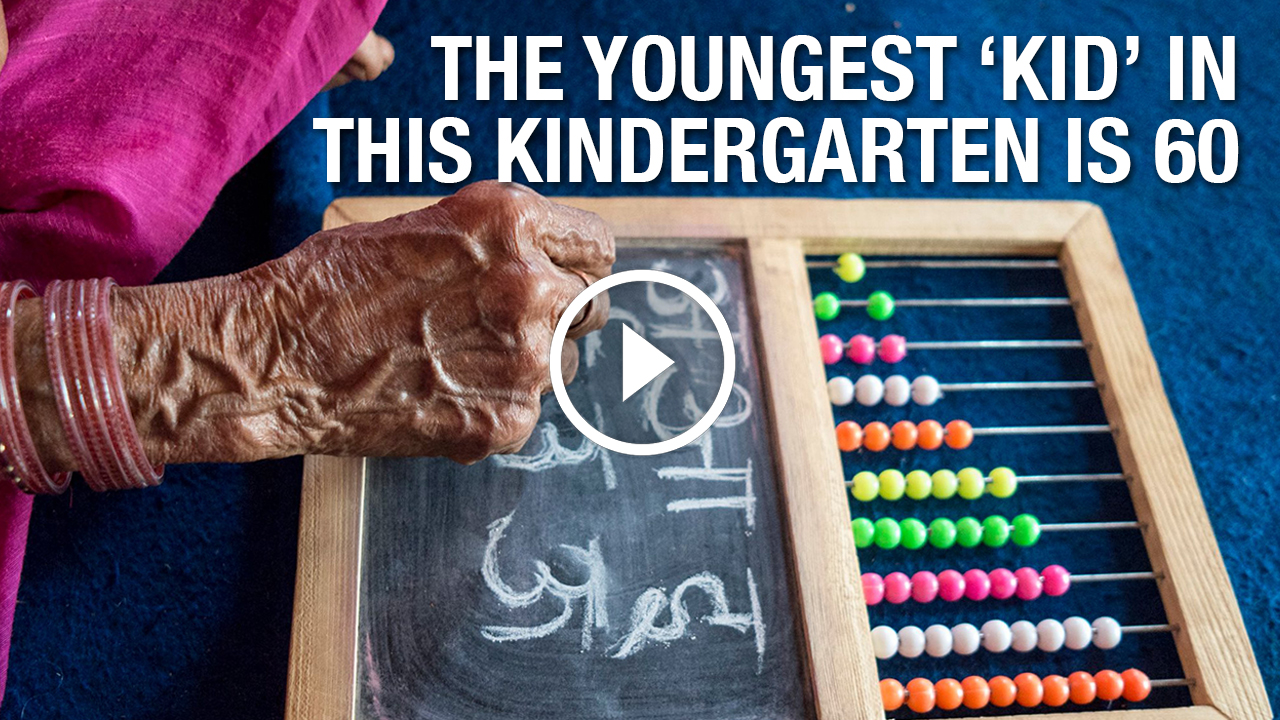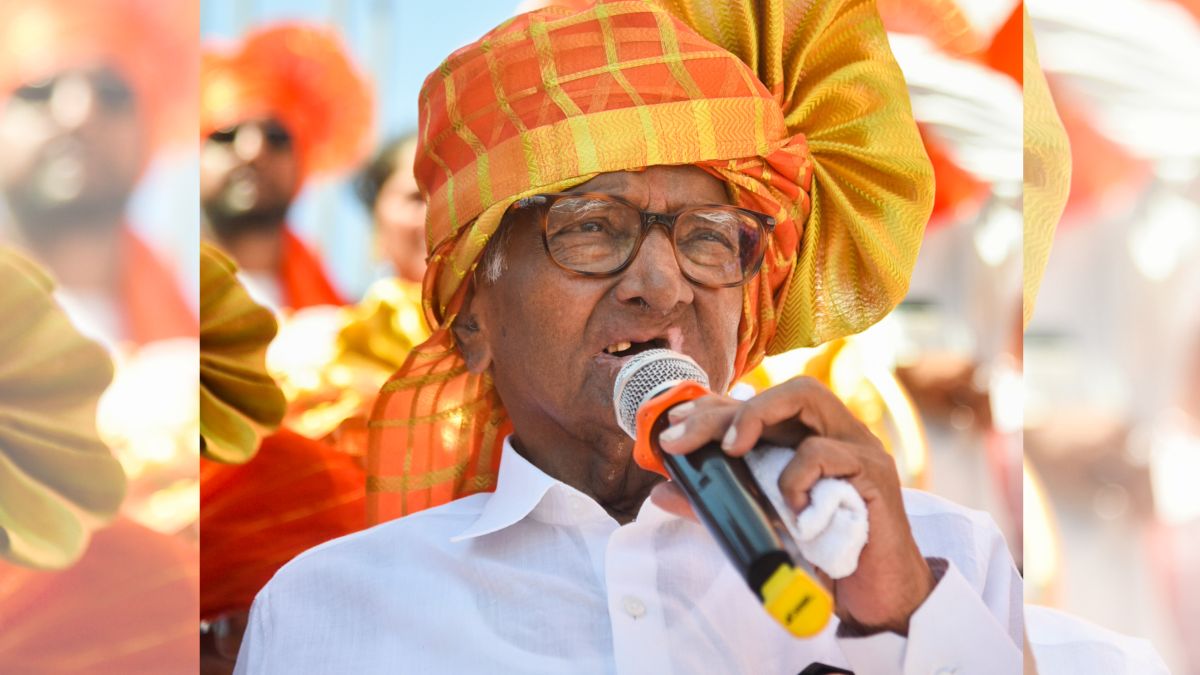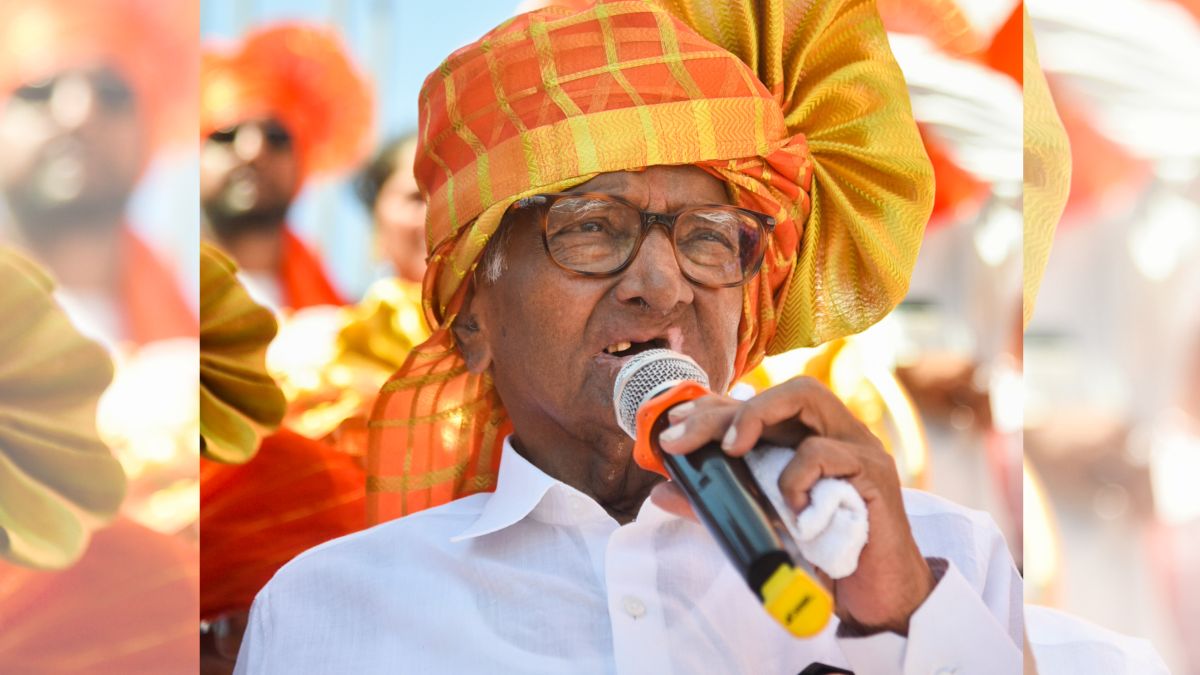It is a parched summer afternoon in this remote and hilly village of Maharashtra, located a little over 125 kilometres from Mumbai. Kantabai More looks in a hurry to finish her daily chores. Dressed in a pink uniform, the school girl is meditating in front of a miniature temple inside her single-story house. Amid chanting of prayers, she intermittently opens her eyes to look at the wall clock.
“It is 1:30. Hurry up or I won’t be able to drop you to school today,” announces a boy who entered the room like a gust of wind and then disappeared in the same fashion.
Nudged, Kantabai cuts short her prayers, picks up her school bag and sets out for school, holding the hand of her ‘guardian’.
Nitesh is Kantabai’s grandson who drops her to school every day after returning from his own school.
At 65, the un-schooled grandmother is going to school to rid herself of the stigma of being an illiterate. The saying that learning has no age limit gets a real-life meaning in this school in Phangane village of Thane district.
“When we go to the bank, we feel ashamed about giving our thumb impression. People laugh at us for not being able to sign our name. I feel that I should at least be able to sign my name. This is why I decided to go to school,” says Kantabai on her way to school, braving the baking summer sun.
She goes on: “As a child, I never attended school. I had four siblings — three sisters and two brothers. But only my brothers were sent to school. Our father would tell us that he did not have the money to educate all of us. My parents would go out to work in the fields. So my father never sent us — the girls — to school. All three sisters, including me, stayed at home, and we would be assigned the job of fetching water and doing household chores.”
Things didn’t change for her even after marriage.
Hence, switching from doing daily household chores to chanting nursery rhymes, remembering alphabets hasn’t been an easy task for Kantabai and her classmates — all aged between 60 and 90.
Aajibaichi Shala or Grandmothers’ school, which started a month ago on the International Women’s Day, has started a quite revolution in this nondescript village.
For a village that faces perennial water crisis, the school brought another blessing – in the form of running taps. Most families make a living from subsistence farming and doing menial jobs at the industrial units in nearby town. The village that has no public transport or primary healthcare unit the school give a good hope to people.
The Motiram Dalal Charitable Trust and Yogendra Bangar, an award-winning teacher from Phangane Zilla Parishad’s primary school, not only founded India’s first school for unlettered grannies, they also made portable water a reality in the village.
The trip motivated the women to do something meaningful in life. One of them is Ramabai Ganpat Chandelle. The 87-year-old lady lives all by herself in a thatched house. The school has given a new purpose to her life. Like any first-timer, Chandelle is very excited about the idea of doing something new. She would finish all her household chores much before the school time, get draped in her school uniform and eagerly wait for her classmates to come by.
“I am like a ripe fruit that might fall off the branch anytime. I couldn’t go to school as a child and remained illiterate all my life. But I don’t want to die illiterate. Now, I am happy that I would be able to carry a few words with me to the other world,” says the octogenarian.
Aajibaichi Shala is neither a morning school nor an evening one. It begins at 2 pm and continues till 4 pm.
“We chose the timing keeping in mind that all these women help with daily chores at home. This is only time slot when they are usually free,” said Bangar, the teacher who conceived the idea of the school.
After a 10-minute assembly and roll calling, the class begins. Alphabet practice makes the core of the session where every student is supposed to write the alphabet on their slates and show it to the teacher.
Of the 28 students, many are frail. If some have weak eyesight, others are hard of hearing. Many of them are escorted on the school that is less than 500 meters from their homes.
Initially, their grandchildren laughed at the ideas of them going to school, they were more than eager to drop them to school.
The anxious grannies are now coping with daily homework and an upcoming unit test. This will be their first-ever academic exam.
“When I come back home, the grandchildren tell me, ‘Granny, this is how you write this,’ or ‘Granny, this is how you read this.’ They teach me everything. They sit and study along with me. It’s great fun. We read each other’s lessons. We read out poems to each other. We write our lessons… We are certainly happy that we became literate at this age,” said Kantabai.
Her classmate Gulab Kedar, 72, chimes in: “I also never went to school. My children and grandchildren dropped me to school on the first day. My son asked me, ‘Mother, are you going to school?’ I said. ‘Yes’. He said, ‘That’s good… Go’. They came to drop us to school. They were very happy.”
The kind of support and encouragement the school has got from the little educated or unlettered villagers is overwhelming.
Yogendra Bangar, who conceived the idea of the school, says: “Everybody in the village encouraged us, no one said a thing against the school. They said: ‘Nobody has done something like this before. Whatever you are doing is good for the society. We are with you.’
He goes on: “Knowledge has great importance in life. It is very important to educate these elderly people who never got an opportunity to go to school. We started this school to bring happiness to their lives and make the village 100 percent literate.”
Though the school is providing alphabet lessons now as the first goal is to make them literate, it has other plans to the ladies. “We have planned some creative initiatives wherein they will be trained to make hand-woven quilts and paper bags,” said Bangar.
Motiram Dalal Charitable Trust, which runs the school, started the initiative to ‘convey the message that these elderly people are very important for our society’. “We started this school to inculcate love and respect for the elderly,” says Dilip Dalal, the founder of the trust.
If nothing, the school has given these elderly women a purpose in life. Instead of sitting and praying in some isolated corner of the house, they are now communicating with their classmates and teachers in school. At home, the grandchildren have become their classmates — and at times mentors. They sit together and learn from each-other. Suddenly, the generation gap is gone and homes have become livelier.
“I am in the last leg of my life. I know don’t when I will be gone. One thing I know that I don’t want to die unlettered. Now, I can at least take a few words with me to the other world,” sums up Kedar.


)




)
)
)
)
)
)
)
)